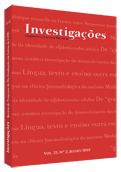De “Grandes” a Pequenas Estórias: contribuições de uma nova perspectiva para a análise da narrativa
Resumo
Este trabalho discute dois modelos teóricos para a análise da narrativa, a partir da identificação deste tipo textual enquanto a) artefato elaborado por um ou mais falantes, recapitulando experiências pessoais, composto de seções específicas e; b) construto temporalmente organizado, cuja extensão e formato não são fixos. No primeiro caso, o foco são as narrativas completas do modelo Laboviano. No segundo, incluem-se as “pequenas estórias” (Georgakopoulou 2007), foco da mais recente linha analítica. Exemplificamos a análise de narrativas orais, coletadas em português, que emergiram no contexto de conversas-entrevista, nas quais os falantes descreviam experiências de racismo.Referências
BAMBERG, Michael G. W. 1997. Positioning Between Structure and Performance. Language and Society 25: 167-203.
CHAFE, Wallace. 1990. Discourse, Consciousness and Time. Chicago: University of Chicago.
CHARON, Rita. 1986. To Render the Lives of Patients. Literature and Medicine 5:58-74.
CLARK, Herbert & RICHARD, Gerrig. 1990. Quotations as Demonstrations. Language 66:764-805.
DE FINA, Anna. 2003. Identity in Narrative: A Study of Immigrant Discourse. Amsterdam/Philadelphia: John Benjamins.
______. 2000. Orientation in immigrant narratives: The role of ethnicity in the identification of characters. Discourse Studies 2(2):131-157.
FAIRCLOUGH, Norman. 1992. Discourse and social change. Cambridge: Polity Press.
FLANNERY, Mércia S. 2008. She discriminated against her own race: voicing and identity in a story of discrimination. Narrative Inquiry 18(1):111-130.
GEORGAKOPOULOU, Alexandra. 2007. Small Stories. Interactions and Identities. Amsterdam/Philadelphia: Johns Benjamins.
GOFFMAN, Ervin. 1981. Forms of Talk. Philadelphia: University of Pennsylvania Press.
GOODWIN, Charles. 1986. Audience Diversity, Participation and Interpretation. Text 6:283-316.
HARRÉ, Rom; LANGENHOVE, van Luk. (eds.) 1999. Positioning Theory. Oxford:Blackwell Publishers.
LABOV, William. 2001. Uncovering The Event Structure of Narrative. Georgetown University Round Table on Languages and Linguistics, Washington, DC: Georgetown University Press, pp. 63-83.
LABOV, William & WALETSKY, Joshua 1967. Narrative Analysis: Oral Versions of Personal Experience, In: Helm, J. (Ed.). Essays on the Verbal and Visual Arts. Seattle/ London: University of Washington Press, pp. 12-44.
MISHLER, Elliot G. 1986. Research Interview: context and narrative. Cambridge, Massachusetts: Harvard University Press.
OCHS, Elinor and CAPPS, Lisa. 2001. Living Narrative: Creating lives in everyday storytelling. Cambridge, Mass.: Harvard University Press.
POLANYI, Livia. 1985. Telling the American story. Norwood: Ablex.
SCHIFFRIN, Deborah. 2006. In other words: variation in reference and narrative. Cambridge: Cambridge University Press.
______.1996. Narrative as Self-Portrait: Sociolinguistic. Constructions of Identity Language in Society 25(2):167-201.
______. 1982. Tense Variation in Narrative. Language 57: 45-62.
TANNEN, Deborah. 1989. Talking Voices: Repetition, Dialogue and Imagery in Conversational Discourse. Cambridge University Press.
VAN LEEUWEN, Teun.1996. The representation of social actors. In: Rosa Caldas, Carmen; Coulthard, Malcolm. Readings in critical discourse analysis. New York: Routledge.
Downloads
Publicado
Como Citar
Edição
Seção
Licença
Copyright (c) 2010 Mércia Regina Santana Flannery

Este trabalho está licenciado sob uma licença Creative Commons Attribution 4.0 International License.
Autores que publicam na Revista Investigações concordam com os seguintes termos:
Autores mantêm os direitos autorais e concedem à revista o direito de primeira publicação, com o trabalho simultaneamente licenciado sob a licença Creative Commons Atribuição 4.0 Internacional (CC BY 4.0) que permite o compartilhamento do trabalho com reconhecimento da autoria e publicação inicial nesta revista.
Autores têm autorização para assumir contratos adicionais separadamente, para distribuição não-exclusiva da versão do trabalho publicada nesta revista (exemplo: depositar em repositório institucional ou publicar como capítulo de livro), com reconhecimento de autoria e publicação inicial nesta revista.
Qualquer usuário tem direito de:
Compartilhar — copiar e redistribuir o material em qualquer suporte ou formato para qualquer fim, mesmo que comercial.
Adaptar — remixar, transformar e criar a partir do material para qualquer fim, mesmo que comercial.
O licenciante não pode revogar estes direitos desde que você respeite os termos da licença.
De acordo com os termos seguintes:
Atribuição — Você deve dar o crédito apropriado, prover um link para a licença e indicar se mudanças foram feitas. Você deve fazê-lo em qualquer circunstância razoável, mas de nenhuma maneira que sugira que o licenciante apoia você ou o seu uso.
Sem restrições adicionais — Você não pode aplicar termos jurídicos ou medidas de caráter tecnológico que restrinjam legalmente outros de fazerem algo que a licença permita.

